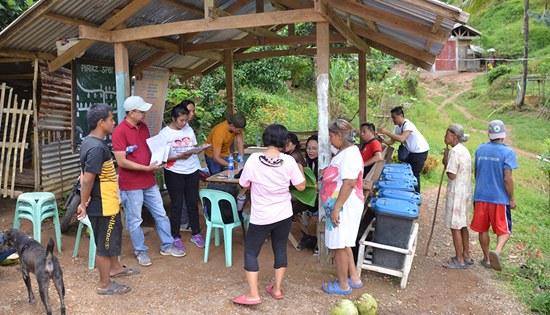DAR intensifies
validation of ARBs in Hilongos town
|

A
team from the Department of Agrarian Reform (DAR) validates
beneficiaries of collective Certificates of Land Ownership
Award (CLOAs) in Hilongos town’s remotest village, Barangay
San Antonio, to be included in the issuance of individual
land titles under the Support to Parcelization of Lands for
Individual Titling (SPLIT) project. |
By
JOSE ALSMITH L.
SORIA
September 4, 2024
HILONGOS, Leyte – A farmer
and former rebel, Armando (not his real name), expressed joy and
gratitude that the Department of Agrarian Reform (DAR), through its
Support to Parcelization of Lands for Individual Titling (SPLIT)
project, saved them from paying exorbitant fees for the conduct of
subdivision survey and applying for an individual land title.
Armando, 59, married, was
among those awarded in the year 2000 with a collective Certificate
of Land Ownership Award (CLOA), after he and other comrades
surrendered to authorities in 1994.
On Wednesday last week,
August 28, Municipal Agrarian Reform Program Officer (MARPO) Ruben
Rebato along with his field validation team (FVT), braved the very
steep, narrow and rugged trail as they hiked for about an hour back
to the mountainous Barangay San Antonio, this town’s remotest
village situated on top of a mountain, to continue the validation of
agrarian reform beneficiaries (ARBs) in the 23 more landholdings
covered by collective CLOAs.
Rebato disclosed that they
validated 75 ARBs listed in the 23 collective CLOAs covering an
aggregate area of 180.8720 hectares of farmlands. He explained that
this is just the initial stage. After this, a survey team will
conduct the subdivision survey to locate the exact area of the
beneficiaries before the individual land titles could be issued.
Under the World
Bank-funded SPLIT project, landholdings covered by collective CLOAs
will be subdivided based on the exact area awarded to each ARBs and
replace it with individual electronically generated land title. This
is to improve land tenure security and strengthen property rights of
the ARBs.
Armando said to the DAR
personnel, “Salamat, nakalibre mi sa gasto sa pagpatitulo.”
He narrated that in 1984,
their village was invaded by the new people’s army (NPA). Many of
them were forced to join, he reminisced. But in 1994, with the
presence of soldiers in their village, they decided to surrender and
were identified by DAR personnel to be potential beneficiaries of
the Comprehensive Agrarian Reform Program’s (CARP’s) land
distribution, Antonio added.
Land distribution is DAR’s
contribution to End Local Communist Armed Conflict (ELCAC), a
whole-of-nation approach in addressing insurgency problem in the
country.